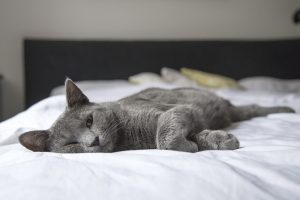 Our feline friends need good, routine medical care in order to thrive. There are some phrases that hurt my heart when I hear them about our cat companions. But the one that I would like to discuss today is that “my cat is indoor only; s/he doesn’t need to go to the vet”. Usually, this is said by the most loving owners from a space of unawareness. We are told that indoor cats are healthier and live longer than their outdoor counterparts, which IS TRUE. However, that doesn’t mean that our feline friends that are indoor only don’t have their own set of health care needs that we should provide.
Our feline friends need good, routine medical care in order to thrive. There are some phrases that hurt my heart when I hear them about our cat companions. But the one that I would like to discuss today is that “my cat is indoor only; s/he doesn’t need to go to the vet”. Usually, this is said by the most loving owners from a space of unawareness. We are told that indoor cats are healthier and live longer than their outdoor counterparts, which IS TRUE. However, that doesn’t mean that our feline friends that are indoor only don’t have their own set of health care needs that we should provide.
Annual wellness examinations. A thorough physical exam includes listening to the heart and lungs (checking for murmurs or abnormal sounds), palpating the abdomen (feeling for masses or irregular textures/sizes of the organs), performing an orthopedic exam (checking for abnormalities in the joints and skeletal structure), and evaluating the eyes, ears, and oral cavity (looking for early disease processes). Because our feline friends are so good at hiding if they are unwell, it is imperative to have these routine physicals to detect illness early. Senior cats, or those with diagnosed diseases, may need to be seen more often.
Vaccination. Oftentimes, I hear that indoor cats don’t need to see the vet as “they aren’t going outside where the disease is spread”. Unfortunately, this just isn’t the case. A bat carrying rabies could accidentally get into your house and bite your cat. Likewise – indoor kitties can contract any of the feline upper respiratory diseases from a stray cat that hangs out near your house, the viruses can travel in through an open window. Or if you bring in a new cat to your household, it can pass on an upper respiratory disease and/or feline leukemia. Please give us a call to discuss your cat’s exposure risk so that we can create a vaccine protocol tailored to your pet’s needs.
Parasite control. This very commonly gets lumped in with the vaccination theory of indoor cats not having an issue with these. Sadly, even our indoor kitties can contract any number of preventable parasites. Mosquitoes carrying heartworms can sneak into the house through an open door or window. We can carry fleas and ticks in on our clothing and not notice them until they’ve caused chaos. Less likely, but still possible, intestinal parasites can still be found in our indoor-only kitties. There are so many preventatives on the market today, let one of our staff members help you decide which would be the best fit for your lifestyle.
Nutrition counseling. Do you know if your feline friend is the appropriate weight? Many diseases can be directly caused or influenced by our pets being overweight. You should be able to feel your cat’s ribs while petting them with minimal pressure and your cat should have an “hourglass figure” when looking from the top. With the multitude of foods available, it can be overwhelming trying to pick which is the best for your kitty. We recommend a life stage appropriate food from a good quality brand (one that has been around for a long time and has the research studies to back it), such as Royal Canin, Hills/Science Diet, and Purina. Also, although it has become highly marketed, “grain-free” foods are actually unnecessary and have proven to be dangerous for our furry friends (cats and dogs). If you have any questions regarding food choice, please let us help you!
Dental care. Yes, cats get dental disease too! The severity and rate of development depend on so many factors – age, genetics, diet, and other health conditions the pet may have. During the physical exam, the veterinarians are able to do a basic assessment while the cat is awake and let you know if further care is needed. The true extent of dental disease is not known until a full oral health assessment is done. This assessment (a full skull CT and oral exam including gingival probing) and treatment (scaling, polishing, and any necessary extractions) are done while the pet is under anesthesia.
Diagnostic testing. Even the most attentive owners miss the early signs of our kitties being sick. Initial organ function loss doesn’t normally cause pets to feel bad. Then as the disease progresses and the cats start to feel the effect of illness, they become masters at pretending to be ok. Lab work panels (including bloodwork, urinalysis, fecal checks, and screening for viral infections) not only help us make a diagnosis once your pet is sick but when done as part of their annual visit can help us establish trends in their organ health. This helps veterinarians discuss lifestyle, diet, nutraceutical, and medicinal changes that may help your pet keep its health.
As you can see, there are plenty of pertinent reasons for your feline friends to be coming in to see us for the annual exam. If your kitty is not a fan of traveling to see us, let us know so we can provide some suggestions (and possibly some medication) that will help make the trip easier for them and you.